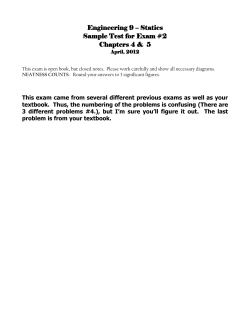
liposome-based immunotherapy - Health Science Research Institute
imm LIPOSOME-BASED IMMUNOTHERAPY FOR TYPE 1 DIABETES TECHNOLOGY APPROACH The invention uses autoantigen-encapsulating liposomes for the prevention or treatment of autoimmune disorders, preferably type 1 diabetes (T1D), in preference during the pre-clinical state. BACKGROUND T1D is one of the most common metabolic diseases in childhood and its incidence is growing in developing countries. In addition, T1D has been increasing throughout the world at 3% per year in recent decades. The peak age for diagnosis of T1D is 12-14 years, but the average age of T1D onset has decreased in the past two decades and a second peak at 4-6 years has been observed. T1D can also be diagnosed in adults. Currently, there is no treatment to restore endogenous insulin secretion in patients with T1D and lifelong insulin therapy is required. Additional, health problems often develop later in life. Because of this and its chronic nature T1D is a costly disease, not only for the affected individual and his/her family, but also for the health authorities. Consequently, the development of new therapies to induce long-term tolerance has been an important medical health challenge. OUR RESULTS TO DATE The invention is based on a previous strategy of the group, consisting on a cell immunotherapy based on autologous dendritic cells (DCs) loaded with apoptotic β-cells for the treatment of autoimmunity in experimental T1D. To overcome the difficulties of sourcing apoptotic β-cells, a synthetic therapy based on liposomes rich in PS (phosphatidylserine) loaded with insulin peptides (Figure 1) has been developed. The researchers demonstrated that the present liposomes are effectively engulfed by DCs, thus inducing tolerance to the antigen and down-modulating the autoimmune cascade. This process is able to decrease the incidence and delay the onset of experimental T1D (Figure 2). Apoptotic mimicry provided by liposomes can offer a solution to the complexity of cell-based therapies with many benefits, as they are lowcost, easy to produce and standardize, to generate on a large-scale and customize. Complete results upon CDA signature. Figure 1. Cryogenic transmission electron microscopy image of liposomes loaded with insulin peptides (PSAB-lipo). v5.6 Figure 2. Percentage of spontaneous T1D in Non Obese Diabetic (NOD) mice treated with liposomes loaded with insulin peptides (PSAB-lipo), empty liposomes (PS-lipo), and sham group. Significant differences between treated group and controls (*). imm LIPOSOME-BASED IMMUNOTHERAPY FOR TYPE 1 DIABETES ADVANTAGES • The antigen-specificity of treatment would not require immunosuppressants • The potential for personalizing the treatment makes it a promising strategy for the clinical use • The facility of manufacture, standardization and relative low-cost of production are key characteristics for the development of the therapy • Other lipid formulations have been clinically approved for the treatment of cancer or infections INTELLECTUAL PROPERTY STATUS PCT LOOKING FOR PRODUCT PROFILE • Licensing Out • Investment • Co-development Category Target Product Profile Clinical Indication Prevention or treatment of autoimmune disorders, preferentially type 1 diabetes (T1D) Definition Autoantigen-encapsulating liposomes Efficacy Prevents T1D and decreases insulitis progression in non obese diabetic (NOD) mice Mechanism of action Impairs autoreactive T cell proliferation through PGE2 production INVENTORS Department of Immunology, IGTP: • Dra. Marta Vives-Pi • Dr. Joan Verdaguer • Dra. Irma Pujol-Autonell ICN2: • Prof. Daniel Maspoch • Dra. Mary Cano CLAIMS AND EVIDENCE Dendritic cells pulsed with antigen-specific apoptotic bodies prevent experimental type 1 diabetes. Marín-Gallén S, Clemente-Casares X, Planas R, Carrascal J, Pujol-Autonell I, Carrillo J, Ampudia R, Pujol-Borrell R, Verdaguer J, Borràs FE, Vives-Pi M. Clin exp Immunol 160:207- 214, 2010. PMID: 20030670. Efferocytosis promotes suppressive effects in dendritic cells through prostaglandin E2 production in the context of autoimmunity. Pujol-Autonell I, Planas R, Ampudia R, Marín-Gallén S, Sanchez A, Carrascal J, Marin A, Puig-Domingo M, Pujol-Borrell R, Verdaguer J, Vives-Pi M. PLOS ONE 8:e63296, 2013. PMID: 23691013. Use of autoantigen-loaded phosphatidylserine-liposomes to arrest autoimmunity in type 1 diabetes. Pujol-Autonell I, Serracant-Prat A, Cano-Sarabia M, Ampudia RM, Rodriguez-Fernandez S, Sanchez A, Izquierdo C, Stratmann T, Puig-Domingo M, Maspoch D, Verdaguer J, Vives-Pi M. In press(PLOS ONE), 2015. Núria Martí and Maria Ortega Knowledge and Technology Transfer Office nmarti@igtp.cat|mortega@igtp.cat|T.+34 934 978 664 Institut d’Investigació en Ciències de la Salut Germans Trias i Pujol Ctra. de Can Ruti. Camí de les Escoles, s/n, 08916 Badalona, Spain v5.6
© Copyright 2025











